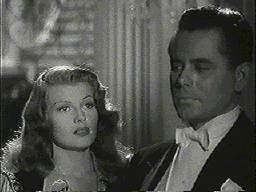
In the film, Gilda, Rita Hayworth sings "Put the Blame on Mame, Boys." This particular song is appropriate since Gilda's entrance into narrative is coincident with the disruption of Johnny and Balen's routine. As Laura Mulvey points out, the introduction of the woman into the narrative propels the story forward, at the same time that she impedes the actions of the (male) protagonist. 1 For Mulvey, these interruptions in the flow of action are a direct result of woman's spectacle and the threat that woman poses. Further, Mary Ann Doane posits that women use the masquerade of femininity for particular gains, and this masquerade plays a part in the threat that woman presents. 2 This essay will explore those themes.
Early on in the film, Balen states that women and gambling don't mix -- a statement that foreshadows the troubles that will be introduced later. In the context of the film, we establish that Gilda and Johnny were estranged lovers, a fact that Balen may or may not have suspected when he married Gilda while on holiday. The introduction of Gilda into Balen's and Johnny's world introduces a love-triangle -- a narrative crisis -- but in a way that causes disruption in the routine. Johnny's feelings for Gilda distract him and keep him from effectively doing his job. For example, when Johnny knows that Gilda is dancing with another man, he uses a ruse to keep Balen from discovering her. The ruse he uses is to claim that he is checking to make sure that a disgruntled business partner doesn't pose a threat to Balen. Johnny manages to deal with the threat that Gilda's actions pose to Balen, but fails to notice that the business partner is hoping to harm Balen.
For Gilda's part, she wants to prove that Johnny is still in love with her. She dances and flirts with other men just to see Johnny react, and when that does not achieve the desired result, she manipulates Johnny by preying on his protectiveness of Balen -- she puts him in the position of covering up her (staged) infidelities. In this sense, Gilda is using what Doane refers to as the masquerade of femininity. In the film, Gilda is always represented as an exaggeration of femininity, with well-coifed hair, and exceptionally feminine dress. Gilda has a fetishistic relationship with clothing: we see her lying on the bed rolling stockings down her legs, or getting Balen to zip her into her dress. In these scenes, she radiates a fetishized sexuality that attracts men, and she uses that attraction to snare them. As Doane points out, this excess of femininity "is necessarily regarded by men as evil incarnate,"3 which is exactly how Johnny views her actions.
Later, after Balen is presumed dead, Johnny takes Balen's place, in an almost Oedipal fantasy fulfillment. He marries Gilda to ensure his position with the cartel, but he arranges elaborate punishments for her infidelities to Balen. For example, on their honeymoon night, they move into a new apartment, but Johnny has placed Balen's portrait prominently on the wall. He then refuses to see her. To prevent her from using her sexuality, he arranges the disappearance of men who take an interest in her. Perhaps most insidiously, when leaves the country, he manipulates her into returning to Argentina with her new lover, a lawyer, under the guise of arranging an annulment. Once in Argentina, the lawyer is revealed to be one of Johnny's agents.
In the latter part of the film, Balen also seeks to punish Gilda. Balen also enacts a form of Oedipal fantasy: he seeks to win the love of Gilda away from Johnny, whom Balen suspects is her first, and true, love. In many respects, Johnny is a father-figure to Balen -- he acts as Balen's protector and advisor -- and Balen plans to kill him and escape with Gilda. As in the primal scene, Balen catches Johnny and Gilda together, and in that moment, Balen hates Gilda, and plans to return at a later date to punish her.
According to Mulvey, the desire to punish is part of a coping mechanism that the male unconscious employs to deal with castration anxiety. According to psychoanalytic theory, part of the psychological development of boys is the realization that girls lack a penis. This invokes in boys a fear of castration, and the presence of women always serves to bring out that fear. Thus, the sexual difference is the source of male anxiety, and it is this anxiety that leads Balen to utter such statements as "women and gambling don't mix."
There is a certain amount of phallic imagery with respect to the relationship between Johnny and Balen. When they first meet, Balen uses his sword-cane (his "little friend") to save Johnny's life, and again, just before Gilda is introduced, they drink a toast to the three of them (Balen, Johnny and the sword-cane). Throughout the film, we are reminded that Johnny and Balen have a relationship with the sword-cane, whereas Gilda does not -- the film codifies her lack.
In conclusion, the title character in Gilda is codified in the film itself as the source of conflict. This conflict is linked with male castration anxiety and as a consequence, the male characters seek to nullify that anxiety by punishing Gilda. The transgression that justifies Gilda's punishment is her articulation of sexual difference -- her exaggerated femininity.
1 Laura Mulvey, "Visual Pleasure and Narrative Cinema", Feminism and Film Theory, p. 62.
2 Mary Ann Doane, "Clinical Eyes: The Medical Discourse", The Desire to Desire: Women's Film of the 1940's, Indianapolis University Press, Bloomington, 1987. p. 40.
3 ibid
Back to my home page.